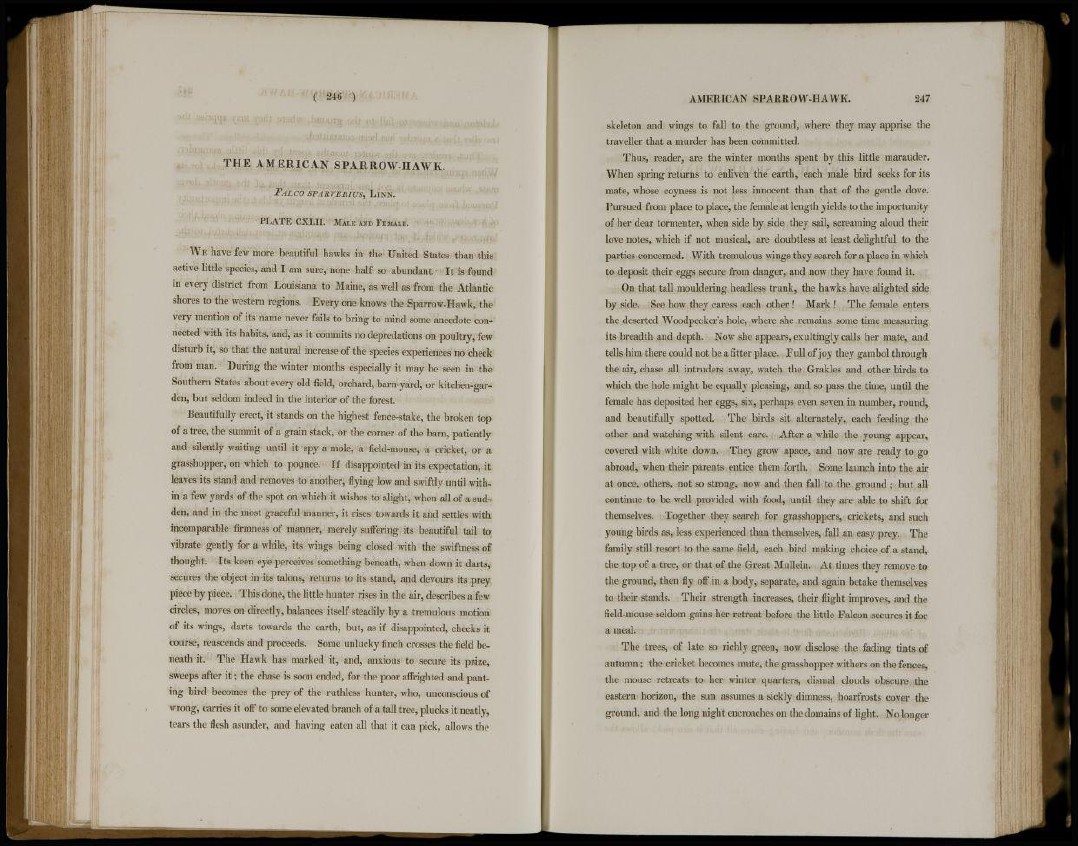
T H E A M E R I C A N S P A R R O W - H A W K .
FALCO SPARVERIUS, LINN.
P L A T E C X L I I . MALE AND FEMALE.
WE have few more beautiful hawks in the United States than this
active little species, and I am sure, none half so abundant. It is found
in every district from Louisiana to Maine, as well as from the Atlantic
shores to the western regions. Every one knows the Sparrow-Hawk, the
very mention of its name never fails to bring to mind some anecdote connected
with its habits, and, as it commits no depredations on poultry, few
disturb it, so that the natural increase of the species experiences no check
from man. During the winter months especially it may be seen in the
Southern States about every old field, orchard, barn-yard, or kitchen-garden,
but seldom indeed in the interior of the forest.
Beautifully erect, it stands on the highest fence-stake, the broken top
of a tree, the summit of a grain stack, or the corner of the barn, patiently
and silently waiting until it spy a mole, a field-mouse, a cricket, or a
grasshopper, on which to poynce. If disappointed in its expectation, it
Leaves its stand and removes to another, flying low and swiftly until within
a few yards of the spot on which it wishes to alight, when all of a sudden,
and in the most graceful manner, it rises towards it and settles with
incomparable firmness of manner, merely suffering its beautiful tail to
vibrate gently for a while, its wings being closed with the swiftness of
thought. Its keen eye perceives something beneath, when down it darts,
secures the object in its talons, returns to its stand, and devours its prey
piece by piece. This done, the little hunter rises in the air, describes a few
circles, moves on directly, balances itself steadily by a tremulous motion
of its wings, darts towards the earth, but, as if disappointed, checks it
course, reascends and proceeds. Some unlucky finch crosses the field beneath
it. The Hawk has marked it, and, anxious to secure its prize,
sweeps after it; the chase is soon ended, for the poor affrighted and panting
bird becomes the prey of the ruthless hunter, who, unconscious of
wrong, carries it off to some elevated branch of a tall tree, plucks it neatly,
tears the flesh asunder, and having eaten all that it can pick, allows the
skeleton and wings to fall to the ground, where they may apprise the
traveller that a murder has been committed.
Thus, reader, are the winter months spent by this little marauder.
When spring returns to enliven the earth, each male bird seeks for its
mate, whose coyness is not less innocent than that of the gentle dove.
Pursued from place to place, the female at length yields to the importunity
of her dear tormenter, when side by side they sail, screaming aloud their
love notes, which if not musical, are doubtless at least delightful to the
parties concerned. With tremulous wings they search for a place in which
to deposit their eggs secure from danger, and now they have found it.
On that tall mouldering headless trunk, the hawks have alighted side
by side. See how they caress each other ! Mark ! The female enters
the deserted Woodpecker's hole, where she remains some time measuring
its breadth and depth. Now she appears, exultingly calls her mate, and
tells him there could not be a fitter place. Full of joy they gambol through
the air, chase all intruders away, watch the Grakles and other birds to
which the hole might be equally pleasing, and so pass the time, until the
female has deposited her eggs, six, perhaps even seven in number, round,
and beautifully spotted. The birds sit alternately, each feeding the
other and watching with silent care. After a while the young appear,
covered with white down. They grow apace, and now are ready to go
abroad, when their parents entice them forth. Some launch into the air
at once, others, not so strong, now and then fall to the ground ; but all
continue to be well provided with food, until they are able to shift for
themselves. Together they search for grasshoppers, crickets, and such
young birds as, less experienced than themselves, fall an easy prey. The
family still resort to the same field, each bird making choice of a stand,
the top of a tree, or that of the Great Mullein. At times they remove to
the ground, then fly off in a body, separate, and again betake themselves
to their stands. Their strength increases, their flight improves, and the
field-mouse seldom gains her retreat before the little Falcon secures it for
a meal.
The trees, of late so richly green, now disclose the fading tints of
autumn; the cricket becomes mute, the grasshopper withers on the fences,
the mouse retreats to her winter quarters, dismal clouds obscure the
eastern horizon, the sun assumes a sickly dimness, hoarfrosts cover the
ground, and the long night encroaches on the domains of light. No longer